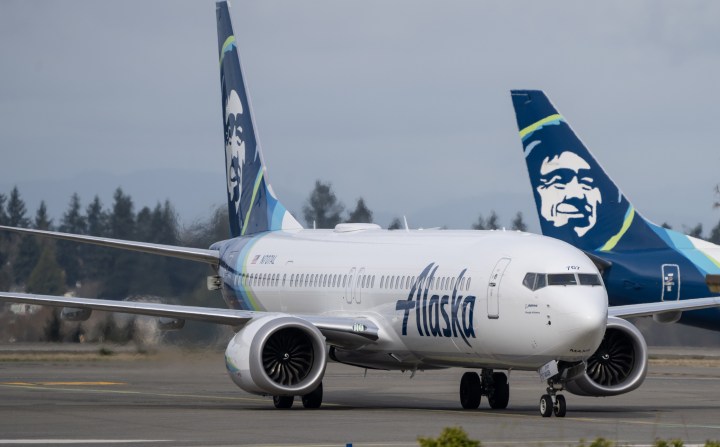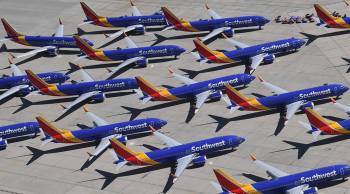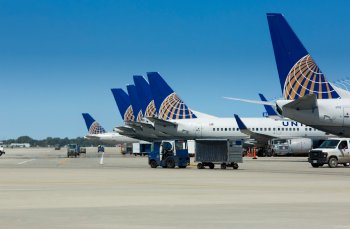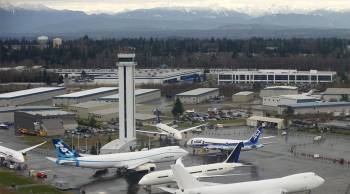
How does an airline expert feel about traveling on Boeing planes?
Share Now on:
How does an airline expert feel about traveling on Boeing planes?

After a series of quality control issues on Boeing planes, company CEO Dave Calhoun has announced his imminent departure from the company.
So far this year, a door plug blew off of a 737 Max 9 jet in midair on an Alaska Airlines flight, loose parts were found on other Max planes, a Boeing 757 plane lost its nose wheel before taking off, and a Boeing 737-800 arrived at its destination with a missing external panel.
In 2018 and 2019, a different Boeing jet, the 737 Max 8, was involved in two deadly crashes. The underlying cause of those crashes had to do with a faulty sensor that caused each plane’s MCAS, or maneuvering characteristics augmentation system, to push the jet’s nose down. Shawn Pruchnicki, an aviation safety expert and assistant professor at Ohio State University, said this particular issue has been rectified.
These incidents have eroded trust between the airplane manufacturer and consumers to the point that some passengers want to avoid flights on Boeing planes entirely, using flight search tools that can exclude Boeing planes.
The oft-repeated line that you’re more likely to get into a car crash on the way to the airport gives little comfort. But Pruchnicki said he still feels safe flying on a Boeing plane and — although this may sound like a contradiction — the company can and should improve its current practices.
How concerning are Boeing’s current issues?
Between 2018 and 2022, the chances of being killed on a flight were 1 in 13.4 million, wrote one MIT professor for The Hill. A 2024 report from the International Air Transport Association found that there were no “fatal accidents involving passenger jet aircraft” last year.
Pruchnicki said that there is heightened scrutiny of Boeing at the moment, but many of the incidents the company has recently faced are not uncommon.
“I understand the fear. I understand that it’s easy for me to say that, being a pilot and an airline pilot investigator,” he said.
However, he added that pilots are generally familiar with incidents involving wheels coming off of planes or panels being ripped off.
Pruchnicki said he has an upcoming flight on a Boeing plane and he has “zero concern whatsoever,” while also noting that he recently took a trip via a Boeing plane without any worries.
“The two events that are meaningful were the Max 8 crashes, and I believe those [issues] have been solved,” Pruchnicki said.
What still needs to change
Pruchnicki pointed out that Boeing has scaled back on the number of workers on the assembly line and quality control experts who would be able to help the company avoid the issues that lead to incidents like the January door blowout.
“The people who work the assembly line are doing the best they can,” Pruchnicki said. “They really do want to do a good job. And when these accidents happen, they are devastated.”
These workers are facing pressure from upper management to reach production goals, he noted.
Vanessa Hill, a professor of management and organizations at Bucknell University, said Boeing initially had “a very strong engineering culture,” focusing on research and development and prioritizing design and safety first.
“Many of their executives rose through the ranks. They started out at Boeing as engineers, and would eventually work their way up,” she said.
But in the 1990s, Boeing began focusing on acquiring other companies and using their designs and technologies, while only modifying their existing planes, Hill said.
“In the past, when they were trying to design a new plane, they would start from scratch, and that is very expensive,” Hill said.
Hill said that the opinions of the financial community began to take precedence over those of the company’s engineers. She noted that there were changes that Boeing made signaling this shift, which included the company’s decision to relocate its headquarters away from its manufacturing facilities.
Hill said that Calhoun’s ouster from his role as CEO represents a full circle moment for the company, because back in 2019, then-CEO Dennis Muilenburg also stepped down.
“This is consistent with their strategy last time — to remove some leaders,” Hill said. “I would hope that this would result in a culture change. But I’m uncertain. I don’t have enough information to be confident that there’s going to be a significant change.”
Hill said she would like to see Boeing conduct a culture audit at its manufacturing facilities and include more subject matter experts on its board. Meanwhile, Pruchnicki said Boeing needs to spend the money and hire more quality assurance employees.
There’s a lot happening in the world. Through it all, Marketplace is here for you.
You rely on Marketplace to break down the world’s events and tell you how it affects you in a fact-based, approachable way. We rely on your financial support to keep making that possible.
Your donation today powers the independent journalism that you rely on. For just $5/month, you can help sustain Marketplace so we can keep reporting on the things that matter to you.


















